Paul Starick: Independent MPs are already issuing their wishlists | The State
The scandal-plagued Marshall Government is 13 weeks away from an unpredictable fate but the odds are firming on one small group faring very well, writes Paul Starick.
Opinion
Don't miss out on the headlines from Opinion. Followed categories will be added to My News.
The highly volatile nature of politics during the Covid-19 pandemic means an already unpredictable South Australian election in March is too close to call.
Premier Steven Marshall started the year in a strong position, even if support was trailing from a pandemic peak.
But the slide into minority government in February unleashed internal unrest in Liberal ranks rarely seen in Mr Marshall’s almost nine-year stint as leader.
This culminated in Kavel MP Dan Cregan’s defection to the crossbench in October, then his installation as Speaker in a midnight coup just four days later.
In the most devastating blow, Vickie Chapman quit as Deputy Premier in November as she succumbed to a conflict-of-interest scandal. Just four days earlier, Mr Marshall had declared his “extraordinary confidence” in her and their leadership of the party and state.
“I think this is now the longest leader-deputy leader relationship in the history of the Liberal Party in SA and, as I may have remarked to the house the other day, it is a relationship which is about twice the length of my marriage,” Mr Marshall told parliament. But the fracturing of this relationship and the Liberals’ parliamentary decline was a sideline to the main game for most South Australians – trying to get on with their lives during the biggest emergency since World War II, the Covid-19 pandemic.
The November 18 no-confidence motion against Ms Chapman and the November 22 revelation by The Advertiser that she would stand down as Deputy Premier and step aside from ministerial roles were obscured by the November 23 state border reopening. Any fallout was overwhelmed by the inevitable influx of Covid-19 cases.
Opposition Leader Peter Malinauskas has campaigned strongly, despite being under quarantine and restrictions for a fortnight because he was a close contact of a positive Covid-19 case – former premier Jay Weatherill.
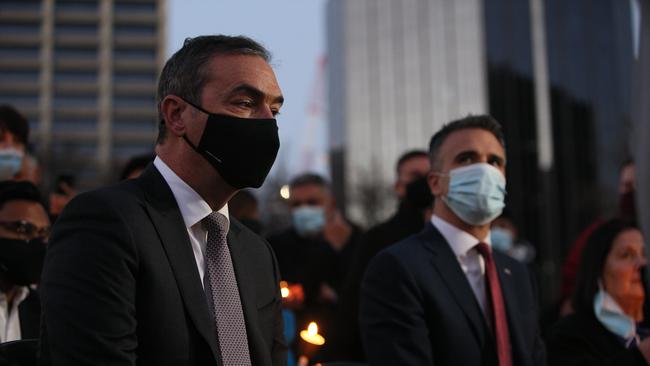
But the key, as-yet-unanswerable questions are whether he and Labor have done enough to seize power on March 19 – and whether the turbulent politics of a pandemic have even more significant twists.
The drought-breaking 2018 state victory secured the Liberals 25 seats to Labor’s 19 – the party’s first majority government after an election since the 1993 win – and seemed to position Marshall as a two-term Premier. Those numbers now sit at 22 Liberal seats to Labor’s 19, with the balance of power in the hands of six independents.
Independents have propped up minority governments of both sides in SA in recent times. It is by no means fanciful to suggest both Mr Marshall and Mr Malinauskas will be courting the crossbenchers after March 19.
The independents have already begun issuing their wishlists.
Waite MP Sam Duluk, a former Liberal, wants funding for a master plan for the former golf course at Belair National Park, the old Blackwood Hospital site to be “reactivated” into a health precinct and station upgrades along the Belair train line.
Narungga MP Fraser Ellis, also a former Liberal, is focusing on health for his manifesto for his Yorke Peninsula seat.
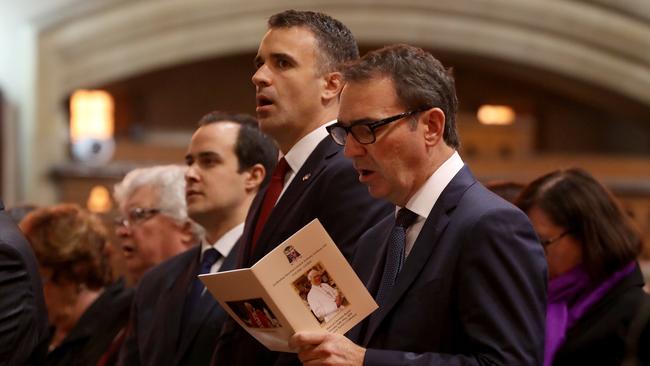
Labor has released some substantial policies, without delivering an avalanche of plans to change the state.
Instead, they help Mr Malinauskas build his key narrative which, in his own words, is to “develop a policy that speaks directly to a growing middle class that is becoming increasingly prosperous”.
He picked a fight with the influential Australian Education Union in October when he vowed to give principals the power to fire underperforming teachers.
Then he unveiled a plan to allow children aged three to be able to go to preschools where operating times will be extended. However, the latter was dependent on a royal commission to guide the changes, leaving Labor open to charges that it would govern by committee rather than making decisions.
Thirteen weeks out from the election, there is no significant mood for change detectable in SA. There have been no major scandals that have generated mass public anger.
Both leaders face historical challenges to win. Mr Marshall would become the first state Liberal leader to win an election after serving a full term in office since 1962, when Sir Thomas Playford won a 10th consecutive term by defeating the Frank Walsh-led Labor Party.
Mr Malinauskas would recover power just four years after the ALP was booted out after a 16-year reign.
TAB odds put the Liberals at $1.65 and Labor at $2.15. The one certainty is that there is no overwhelming favourite.
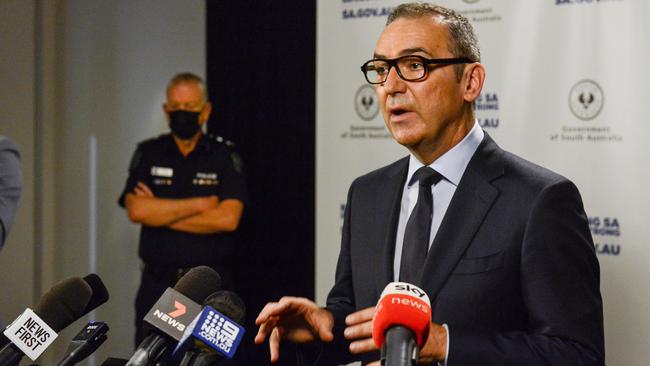
Will the state learn to live with Covid in time for the election?
December 10: South Australia is a state learning to live with Covid-19.
A steady trickle of daily cases has flowed since state borders were opened on November 23, punctuated by the Norwood cluster triggered by a Henley High School reunion in the eastern suburb on November 27.
SA Health has weathered the initial storm of complaints about long waits at testing lines, inadequate or confusing details of quarantine procedure, and businesses stung by customer downturns when listed as exposure sites.
For those not confined to medi-hotels or their homes (as this columnist was), life can proceed relatively normally.
But there are consistent reports of people choosing not to go out for fear of visiting an exposure site and then being put through the disruptive quarantine process.
A kind of Covid madness and intolerance is simmering through society. I have completed home quarantine after being declared a vaccinated close contact of former premier Jay Weatherill, who tested positive on December 1. While walking my dog on Thursday, wearing a surgical mask as required for seven days after being released from home quarantine, a middle-aged man slowed his ute, tooted his horn, then swirled his finger near his head and pointed at the mask to indicate I was crazy for donning this outdoors. Freedom of choice is exactly that – someone might choose to wear a mask outdoors.
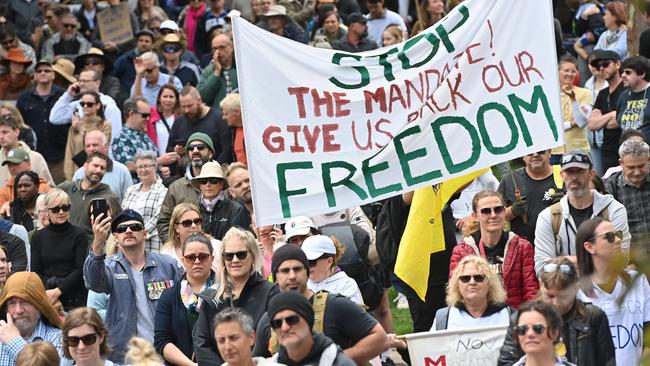
Those attending “freedom” rallies are more than entitled to express their point of view and their right to do so should be stridently defended. But they should remember that their “freedom” to refuse a Covid-19 vaccination is paid for with taxpayer-funded social welfare benefits and a world-class universal health care system.
State authorities have correctly linked vaccination rates to the reduction of social restrictions, based on scientific modelling and evidence.
The wildcard is the Omicron variant, the emergence of which has cast uncertainty over whether SA’s borders will be slammed shut again in the lead-up to Christmas.
Scientists on Thursday said a swath of preliminary data had emerged showing the drop in immunity from the variant.
Dr Deborah Cromer, a senior research fellow at the UNSW Sydney’s Kirby Institute UNSW, said this data had come from studies looking at blood from people who had recovered from Covid-19 and/or been vaccinated against the disease.
“The work now begins to reconcile all the data together to establish a robust answer to this important question. Regardless of the number, it is clear that increased levels of immunity will be required to provide protection against Omicron, and, therefore, booster shots are now more important than ever to help achieve this,” she said.
Premier Steven Marshall on Thursday said, though, that advice about a six-month delay between a second Covid-19 vaccination and a third booster shot had not changed.
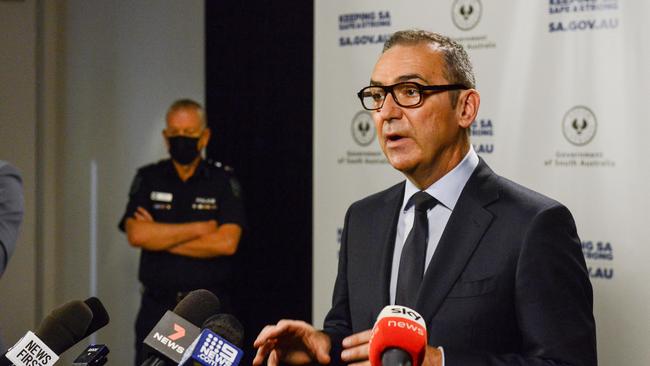
But Mr Marshall also turned the conversation from shutting borders because of Omicron to easing restrictions once the state hits the 90 per cent double-dose vaccination rate for people aged 12 and over.
“In the lead-up to hitting 80 per cent we set a date and we’ll be doing exactly the same with 90,” Premier Steven Marshall said.
“We just need a few more days to see what that run rate is going to be in South Australia. The race is on at the moment to get to 90 per cent of all those 12 and over and I’m hopeful that we can do that by the end of the year.”
This would appear to be an optimistic assessment, based on data drawn from seven-day average rates and dose intervals. That suggests SA will not reach that 90 per cent target until early in the new year, likely about January 9. The predicted date, based on that data, has been creeping later, not earlier, despite authorities’ hopes that vaccination rates would accelerate when Covid-19 crept into the community.
This is a period of political uncertainty. Covid-19 has entered the state and has neither erupted nor been eliminated. More than a fortnight after borders reopened, two people were in hospital after contracting Covid-19 – neither of those were in intensive care. The objectives now are to boost vaccination rates to enable restrictions to be removed while keeping pressure off hospitals.
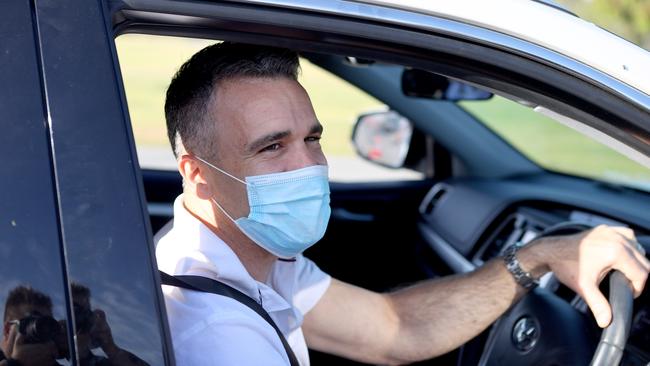
Opposition Leader Peter Malinauskas’s election campaign was frustrated by his own stint in home quarantine but, upon his release, he has continued to portray Mr Marshall as abdicating power to Police Commissioner Grant Stevens and the transition committee.
Regardless of the accuracy of this charge, Mr Marshall’s bid for re-election in March will be substantially shaped by whether the state learns to live with Covid-19 in the next few weeks. As the leader, he will wear responsibility, whichever way this goes.
The politics behind Antic’s vaccine mandate stance
by Paul Starick
It seems a type of Covid-19 craziness is gripping South Australia as the virus starts circulating after the reopening of state borders.
State parliament was temporarily shut down, and the Governor and Opposition Leader sent into isolation because former premier Jay Weatherill contracted Covid-19 at a high school reunion in Norwood on Saturday night.
The man who led Port Adelaide to its AFL premiership in 2004, Warren Tredrea, is absent from his Channel 9 sports presenter job – it’s thought because he is refusing to have a Covid-19 vaccination.
Liberal Senator Alex Antic on Thursday night was escorted by police from Adelaide Airport to a medi-hotel, where he will be required to spend 14 days in quarantine.
This is now a requirement for entry into SA for people who have not received two doses of an approved Covid-19 vaccine.
These are all extreme situations that, if the Covid-19 pandemic had not wrought such havoc, would be issues for lengthy and important community debate. However, the rapid pace of pandemic-induced change has meant the next astonishment is just around the corner. Senator Antic’s situation, though, deserves more insight. The anti-vaccine-mandate campaigner is no fool, even if many in the constituency he seeks to represent are excited by half-truths, misinformation and unsound reasoning.
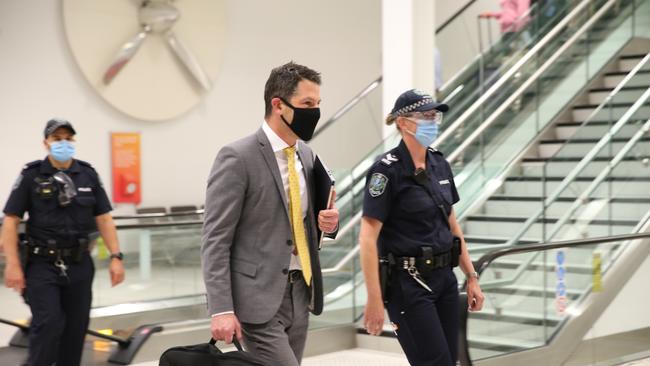
A conservative, Senator Antic is seeking to occupy the space left vacant by former Liberal state president and senator Cory Bernardi, who finished an almost 16-year stint in federal parliament in 2020 as leader of the Australian Conservatives.
Both are cast in the mould of former US president Donald Trump and both have expressed considerable support for his causes. Fair enough.
Like Mr Bernardi, Senator Antic is a libertarian, speaking out for personal freedoms and decrying political correctness and the heavy hand of bureaucratic overreach.
These are important topics, particularly given the pandemic has resulted in severe measures including people being confined to their homes in statewide lockdowns.
Mr Bernardi has a thick skin, self-deprecating humour and great tenacity.
Senator Antic, though, is somewhat skilfully seeking to weaponise the issue of vaccine mandates by claiming some sort of conspiracy to imprison him in a quarantine hotel.
The issue of his Covid-19 vaccine status has become a guessing game, with players including Prime Minister Scott Morrison, who has said Senator Antic was double-dosed.
Senator Antic is perfectly entitled to refuse to reveal his vaccination status and also to refuse a Covid-19 jab in the first place. But is he trying to be a little too clever? As one ABC caller said on Friday morning, if his conviction is not to be vaccinated, then he should have the courage to say so.
As a former lawyer and current lawmaker, he can do better than profess ignorance of the reason for his confinement to a medi-hotel during a global pandemic.
It also would appear many of his constituents are seeing this as an apparent smokescreen.
In his 2019 maiden speech, Senator Antic, who attended Burnside Primary and Pembroke schools in Adelaide’s eastern suburbs, spoke of his “fondness for the country”.
“People from the regions have an unwavering grasp of the things which really matter. The basic tenets of “FAMILY, FAITH, FREEDOM AND THE FLAG” (his emphasis) are alive and well in the country,” he said.
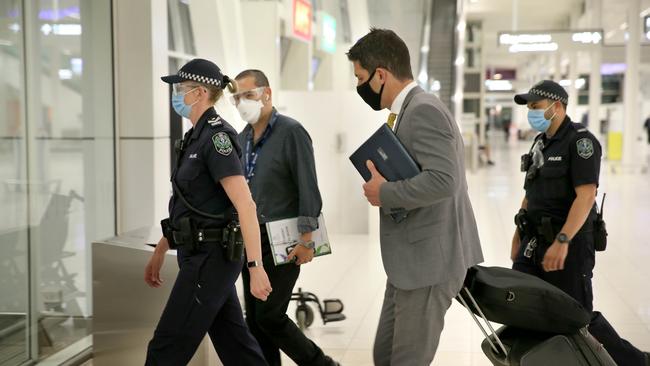
It is worth contrasting Senator Antic’s Trumpian attempt to play to the anti-vax crowd with the approach of Flinders MP Peter Treloar, an Eyre Peninsula farmer who is retiring at March’s state election after 12 years in state parliament.
In his valedictory speech on Tuesday, Mr Treloar bemoaned the unprecedented entrenchment of bureaucracy in governments and suggested building relationships across political divides was the way to get results for constituents.
“As a simple country boy, it surprised me that it was almost acceptable to pull somebody else down in order to get up yourself, and you see that in politics here and probably in every jurisdiction around the world,” he said.
“It is not something we see very often anywhere else, so I think we need to consider actions such as that as we go forward.”
Mr Treloar might not have courted controversy or sought to divide but he will end his political career having won the respect of his electorate – he secured 68.2 per cent of first-preference votes in 2018.
He has the respect of colleagues and even his fiercest opponents, such as former treasurer Tom Koutsantonis.
Winning respect like that is a challenge that lies ahead of Senator Antic.





